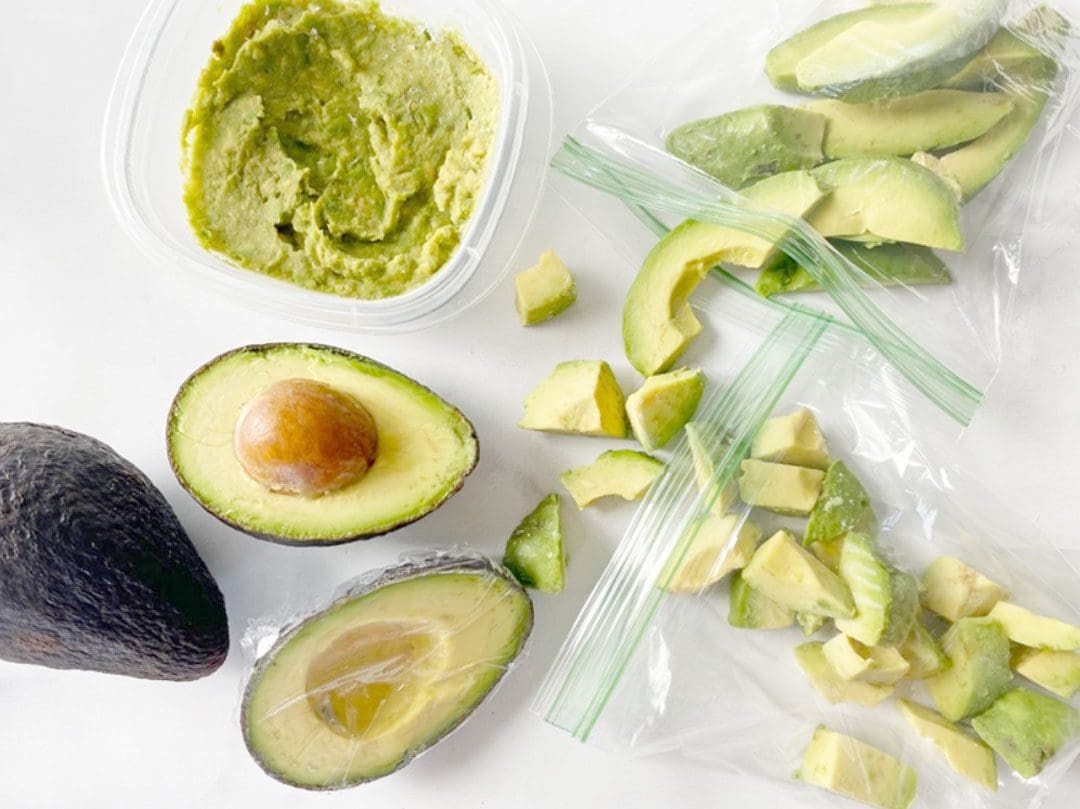Individuals need to eat more fiber for optimal gut health. Can adding avocado to their diet help improve the gut microbe diversity?

Table of Contents
Avocado Gut Support
A diverse gut microbiome is beneficial to overall health. According to a recent study, eating one avocado a day can help maintain the gut microbes healthy, diverse, and balanced. (Sharon V. Thompson, et al., 2021) The researchers observed positive changes in gut bacteria and increased bacterial diversity in individuals who consumed an avocado every day for 12 weeks. (Susanne M Henning, et al., 2019)
Gut Diversity
The gut microbiome refers to the microorganisms living in the intestines. There are around 100 trillion microorganisms, including bacteria, viruses, fungi, and more, exist in the gastrointestinal tract. (Ana M. Valdes, et al., 2018) Having a diverse microbiome means that the body has a range of different organisms that offer various health benefits. Not having enough bacterial diversity has been linked to: (Ana M. Valdes, et al., 2018)
- Arthritis
- Obesity
- Type 1 diabetes
- Type 2 diabetes
- Inflammatory bowel disease
- Celiac disease
- Arterial stiffness
- Atopic eczema
Why Avocados?
- The Institute of Medicine recommends a daily fiber intake ranging from 19 grams to 38 grams per day, depending on various factors like age. (Diane Quagliani, Patricia Felt-Gunderson. 2016)
- Approximately 95% of adults and children do not consume the recommended amount of fiber. (Diane Quagliani, Patricia Felt-Gunderson. 2016)
- Including foods like avocados in a healthy diet can help meet daily fiber requirements.
- Fruit fiber like pectin, has been shown to promote a healthy gut microbiome as well. (Beukema M, et al., 2020)
- Researchers suggest this could be because of pectin’s positive effect on beneficial probiotics.(Nadja Larsen, et al., 2018)
- Although further research is needed fiber is believed to help protect the lining of the colon by increasing the bulk and weight of stool and expediting elimination.
- Fiber also adds bulk to an individual’s diet and slows the speed of digestion, which makes the body feel fuller longer.
Improved Gut
Individuals can support a healthy microbiota by making small adjustments in their diet, including:
- Eating a variety of fruits and vegetables with the skin, as this is where a majority of the nutrition is.
- Fermented foods like yogurt, kombucha, sauerkraut, kimchi, and kefir.
- Limiting consumption of processed foods, sugar, and artificial sweeteners.
- More whole-grain foods.
Ways to eat more avocados include adding them to:
- Smoothies
- Salads
- Sandwichs
- Guacamole
- If there are more avocados that can be eaten before they overripen, they can be frozen.
- Peel and slice them first, then place them in freezer bags to have year-round.
- They are rich in healthy fat, however, in moderation, they are not likely to contribute to weight gain.
Individuals can work toward having a diverse gut microbiome by paying attention to the foods they eat. Specific foods and dietary patterns can influence the different types of bacterial diversity which can support health.
Smart Choices, Better Health
References
Thompson, S. V., Bailey, M. A., Taylor, A. M., Kaczmarek, J. L., Mysonhimer, A. R., Edwards, C. G., Reeser, G. E., Burd, N. A., Khan, N. A., & Holscher, H. D. (2021). Avocado Consumption Alters Gastrointestinal Bacteria Abundance and Microbial Metabolite Concentrations among Adults with Overweight or Obesity: A Randomized Controlled Trial. The Journal of nutrition, 151(4), 753–762. https://doi.org/10.1093/jn/nxaa219
Henning, S. M., Yang, J., Woo, S. L., Lee, R. P., Huang, J., Rasmusen, A., Carpenter, C. L., Thames, G., Gilbuena, I., Tseng, C. H., Heber, D., & Li, Z. (2019). Hass Avocado Inclusion in a Weight-Loss Diet Supported Weight Loss and Altered Gut Microbiota: A 12-Week Randomized, Parallel-Controlled Trial. Current developments in nutrition, 3(8), nzz068. https://doi.org/10.1093/cdn/nzz068
Valdes, A. M., Walter, J., Segal, E., & Spector, T. D. (2018). Role of the gut microbiota in nutrition and health. BMJ (Clinical research ed.), 361, k2179. https://doi.org/10.1136/bmj.k2179
Quagliani, D., & Felt-Gunderson, P. (2016). Closing America’s Fiber Intake Gap: Communication Strategies From a Food and Fiber Summit. American journal of lifestyle medicine, 11(1), 80–85. https://doi.org/10.1177/1559827615588079
Beukema, M., Faas, M. M., & de Vos, P. (2020). The effects of different dietary fiber pectin structures on the gastrointestinal immune barrier: impact via gut microbiota and direct effects on immune cells. Experimental & molecular medicine, 52(9), 1364–1376. https://doi.org/10.1038/s12276-020-0449-2
Larsen, N., Cahú, T. B., Isay Saad, S. M., Blennow, A., & Jespersen, L. (2018). The effect of pectins on survival of probiotic Lactobacillus spp. in gastrointestinal juices is related to their structure and physical properties. Food microbiology, 74, 11–20. https://doi.org/10.1016/j.fm.2018.02.015
Post Disclaimer
Professional Scope of Practice *
The information herein on "Avocado: Its Benefits For a Diverse Gut Microbiome" is not intended to replace a one-on-one relationship with a qualified health care professional or licensed physician and is not medical advice. We encourage you to make healthcare decisions based on your research and partnership with a qualified healthcare professional.
Blog Information & Scope Discussions
Welcome to El Paso's Premier Wellness, Personal Injury Care Clinic & Wellness Blog, where Dr. Alex Jimenez, DC, FNP-C, a Multi-State board-certified Family Practice Nurse Practitioner (FNP-BC) and Chiropractor (DC), presents insights on how our multidisciplinary team is dedicated to holistic healing and personalized care. Our practice aligns with evidence-based treatment protocols inspired by integrative medicine principles, similar to those found on this site and our family practice-based chiromed.com site, focusing on restoring health naturally for patients of all ages.
Our areas of multidisciplinary practice include Wellness & Nutrition, Chronic Pain, Personal Injury, Auto Accident Care, Work Injuries, Back Injury, Low Back Pain, Neck Pain, Migraine Headaches, Sports Injuries, Severe Sciatica, Scoliosis, Complex Herniated Discs, Fibromyalgia, Chronic Pain, Complex Injuries, Stress Management, Functional Medicine Treatments, and in-scope care protocols.
Our information scope is multidisciplinary, focusing on musculoskeletal and physical medicine, wellness, contributing etiological viscerosomatic disturbances within clinical presentations, associated somato-visceral reflex clinical dynamics, subluxation complexes, sensitive health issues, and functional medicine articles, topics, and discussions.
We provide and present clinical collaboration with specialists from various disciplines. Each specialist is governed by their professional scope of practice and their jurisdiction of licensure. We use functional health & wellness protocols to treat and support care for musculoskeletal injuries or disorders.
Our videos, posts, topics, and insights address clinical matters and issues that are directly or indirectly related to our clinical scope of practice.
Our office has made a reasonable effort to provide supportive citations and has identified relevant research studies that support our posts. We provide copies of supporting research studies upon request to regulatory boards and the public.
We understand that we cover matters that require an additional explanation of how they may assist in a particular care plan or treatment protocol; therefore, to discuss the subject matter above further, please feel free to ask Dr. Alex Jimenez, DC, APRN, FNP-BC, or contact us at 915-850-0900.
We are here to help you and your family.
Blessings
Dr. Alex Jimenez DC, MSACP, APRN, FNP-BC*, CCST, IFMCP, CFMP, ATN
email: coach@elpasofunctionalmedicine.com
Multidisciplinary Licensing & Board Certifications:
Licensed as a Doctor of Chiropractic (DC) in Texas & New Mexico*
Texas DC License #: TX5807, Verified: TX5807
New Mexico DC License #: NM-DC2182, Verified: NM-DC2182
Multi-State Advanced Practice Registered Nurse (APRN*) in Texas & Multi-States
Multistate Compact APRN License by Endorsement (42 States)
Texas APRN License #: 1191402, Verified: 1191402 *
Florida APRN License #: 11043890, Verified: APRN11043890 *
License Verification Link: Nursys License Verifier
* Prescriptive Authority Authorized
ANCC FNP-BC: Board Certified Nurse Practitioner*
Compact Status: Multi-State License: Authorized to Practice in 40 States*
Graduate with Honors: ICHS: MSN-FNP (Family Nurse Practitioner Program)
Degree Granted. Master's in Family Practice MSN Diploma (Cum Laude)
Dr. Alex Jimenez, DC, APRN, FNP-BC*, CFMP, IFMCP, ATN, CCST
My Digital Business Card
RN: Registered Nurse
APRNP: Advanced Practice Registered Nurse
FNP: Family Practice Specialization
DC: Doctor of Chiropractic
CFMP: Certified Functional Medicine Provider
MSN-FNP: Master of Science in Family Practice Medicine
MSACP: Master of Science in Advanced Clinical Practice
IFMCP: Institute of Functional Medicine
CCST: Certified Chiropractic Spinal Trauma
ATN: Advanced Translational Neutrogenomics





 Again, We Welcome You.
Again, We Welcome You.
Comments are closed.